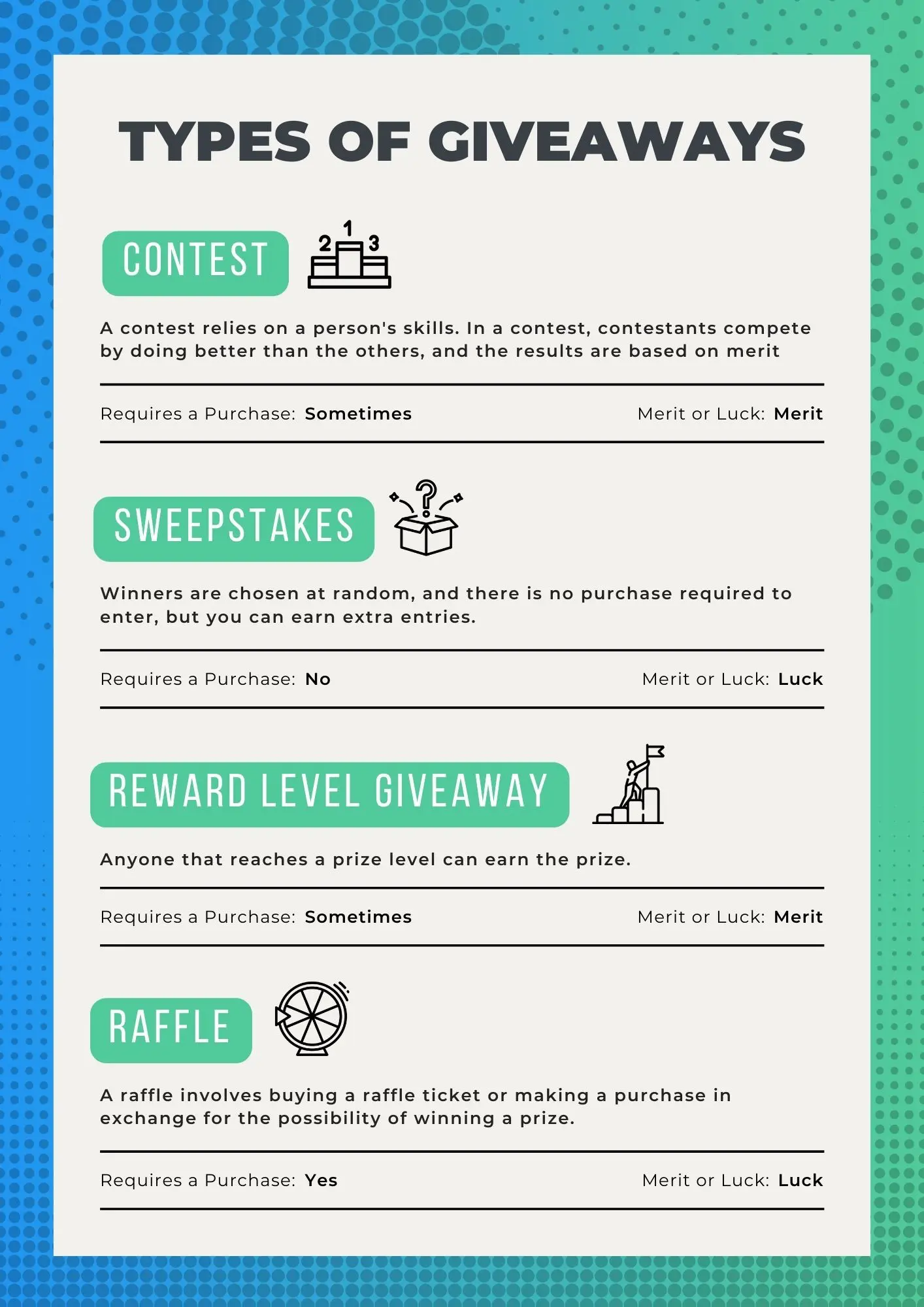Giveaways are a great way to promote your brand or business. However, there are many different types, each with its own pros, cons, and requirements. It can be daunting to choose the right promotion for your business and to begin running it, but this guide will help you get started with running a giveaway legally in the UK.
The different kinds of giveaways include the following:
1. A sweepstakes. This is a free promotion that selects the winner randomly. Participants will also be able to earn additional entries, instead of paying for them.
2. A lottery or raffle. For this type of giveaway, participants must make a purchase to qualify for the prize. Typically, they are able to buy multiple entries, so their chances of winning will increase with further purchases.
3. A reward level giveaway. These may or may not require that participants pay to enter, but instead of having one winner, the prize will be made available to anyone who meets the requirements.
4. A contest. Skills or knowledge are key here, as entrants will compete against each other, and the winner will be determined based on merit.
Promotions or giveaways that do not require a purchase are the easiest to orchestrate. This is because there are legal restrictions on lotteries, as they are considered to be a form of gambling. To run a paid giveaway, you will need a license. Luckily, there are some ways to ensure that this does not apply to your promotion.
Avoiding the licensing requirement:

There are two main ways to structure your giveaway so that it isn’t subject to the licensing requirement.
1. You can make the contest free to enter. If entries are paid for, then the promotion will be considered gambling and you’ll be required to obtain a license. However, no license is necessary if the giveaway is free.
2. Turn it into a competition. If contestants earn their prize by displaying superior skills, knowledge, or instincts, then the giveaway may not be considered to be a lottery or to involve gambling. This means that no license will be required, but this will only be true if the competition can pass the “skills test” in a court of law. This means that the criteria to win cannot be structured so as to keep most people from entering or winning.
If a contest relies on a certain skill to win a prize, the expectations must be reasonable. However, you can design the promotion so that the skills-based challenge merely earns participants an entry into a drawing that will determine the winner of the grand prize. This promotional setup will not require a license. It’s also important to note that the restrictions on giveaways vary depending on your location. This is going to be especially true for any that are paid, like lotteries or raffles.
Sample rules to establish for all giveaways:

Please refer to our best practice guidelines for keeping any Giveaway legal and fun. (https://kickofflabs.com/blog/contest-law-best-practices) To summarize the important parts of that for the UK:
- Determine the duration of the promotion. You’ll need to know when the contest will end, so you can know when to stop taking entries.
- Identify any entry restrictions. It’s important to make clear who is allowed to enter the giveaway. Specify if there are regions that prohibit involvement in your promotion, like Northern Ireland. It’s also common to restrict entries to people of a certain age, usually 18.
- Decide how the winner will be established. This could be as simple as using a computer program to pull a winner, like drawing a name from a hat. However, if you’re running a competition, you’ll need to take extra steps to determine how the skills or knowledge of the participants will be judged.
A complete template is built into KickoffLabs, but you can also download our rules for free to modify for your own use.
When running giveaways in the UK, our sweepstakes platform includes customizable official rules templates and fraud detection to help ensure compliance.
It’s very important that you outline the rules of your giveaway very clearly and in detail. You can sometimes promote one on social media by including a sentence or two to describe the event, but then you’ll still want to provide a link to a full breakdown of all the entry requirements as well as the ways that a winner will be determined and provided with their prize.
If you’re running a lottery, raffle, or paid-to-enter promotion:
In Great Britain, the Gambling Act holds that organizers of certain types of promotions, such as lotteries, must be licensed. There are exceptions, like if you are hosting it in a workplace, but if it’s one that is open to the public, you’ll need to secure a license or you may be criminally Prosecuted.
Yet this is only true for England, Scotland, and Wales because these countries are all overseen by the same Gambling Commission, which creates the regulations for lotteries and raffles. Northern Ireland happens to be a bit different as it has a different governing body that is concerned with promotions of this kind. So you should know that the laws will be different across the whole of the UK, but will be the same within Great Britain. Only Northern Ireland differs when gambling is concerned.
Therefore, if you aren’t able to reconcile your giveaway with both regions’ regulations, you can always specify that people who live in Northern Ireland cannot qualify for the prize. Just make sure to limit entries to residents of Great Britain. This will ensure that you only have to be concerned about acting in accordance with one set of rules.
Of course, the simpler solution is to go with a different type of giveaway that does not require paid entries. However, either way, once you know that your contest is legal - whether you are licensed or you have taken steps to ensure no license is required.
Reasons to run a giveaway
- They can help drive sales by drawing attention to a newly launched product. If you give a new product away, most customers that enter the contest will not win. However, all customers that enter will have increased awareness of the new offering and be more likely to purchase it in the future.
- They can boost customer engagement with your website or newsletter. Promotions are a great way to encourage customers to visit your site or to sign up for email marketing.
- They help strengthen ties and connections between customers and brands. Customers appreciate businesses that offer them the chance to win free products or other prizes, and even if a customer loses your giveaway, they will reflect positively on your brand. This means they are more likely to shop with you in the future.
Run Legal Giveaways with Confidence
Choose compliant campaign types:
- Bonus Entry Giveaway - Legal sweepstakes structure
- Leaderboard Giveaway - Transparent rankings
- Reward Programs - Compliant incentive structures
Built-in compliance features:
- Fraud Detection - Protect contest integrity
- Fair Winner Selection - Random, auditable draws
- Official Rules Templates - Built into every campaign
Wrapping Up
You should now feel more prepared to host a giveaway for your brand in the United Kingdom. Though it may seem daunting at first to figure out what you are permitted to do and what you will require from participants, the rewards will be well worth it.
After you run one successful giveaway, it will be a simple process to do another one in the future!
Read more Legal Giveaway Best Practices with the next chapter:
9. Best Practices in the EU
Understand EU regulations, privacy, and consumer rights for legal giveaways.


